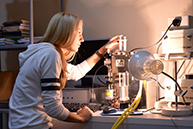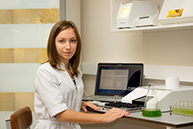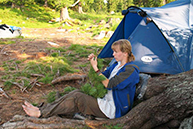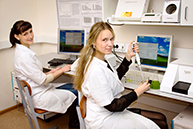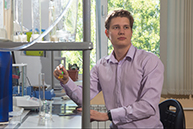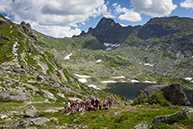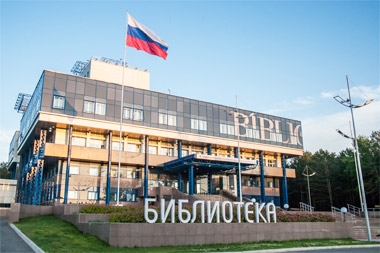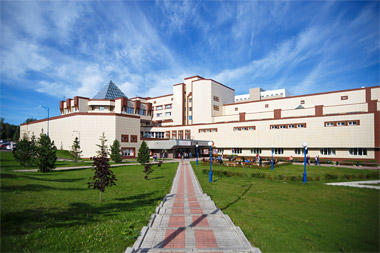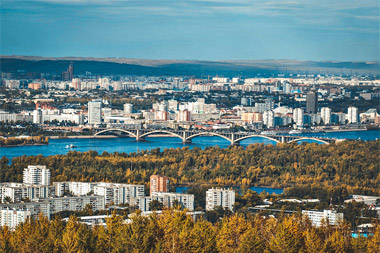Aim
The purpose of this programme is to train new-generation specialists who will be able to perform not only traditional biological, biochemical and ecological analysis but also master the advanced techniques of physico-chemical and molecular genetic analysis.
The objective of the programme
The fundamental biological education will facilitate the formation of biosphere-nooshpere perspective among students and will also help them to develop the set of key competences needed for research, education and information management in the following areas: Bioengineering and Biotechnology, Biophysics, Bioinformatics, Biochemistry and Medical Biology, Bioecology, Genetics, Genomics and Proteomics. Furthermore, students will explore the wildlife and common laws of nature, understand which biological systems can be used in economic and medical areas and how to restore and protect the biodiversity.
This program offers a unique opportunity for study and provides a deep insight into present day research. During first two years students have courses from all learning trajectories. This helps to understand which area is the most interesting and suits your personality. After your second year you will have to choose one of the following professional learning trajectories, and during your final year you will have to do the graduation research project.
Professional learning trajectories:
Unique characteristics:
School of Fundamental Biology and Biotechnology — place which brings together best knowledge and facilities. If you want to discover what happens within the biosphere as a whole or you want to know what concealed in your DNA it is definitely a place for you to continue your education.
Facilities:
The implementation of this program is carried out using modern practice-oriented technologies in active and interactive education. Students learn not only fundamental but also applied principles employed in the modern research.
Major part of the study will be focused on acquiring the practical skills in the laboratory. Depending on the research interest students can work in any of these laboratories:
- The Laboratory of Bioluminescent Biotechnologies
This laboratory was founded under the leadership of the Nobel Prize Laureate and the first Honorary SibFU Professor Osamu Shimomura (USA). This laboratory is quite unique and it was created in order to understand what mechanisms are lying behind the bioluminescence in different organisms. Bioluminescence could be described as the ability of an organism to emit light. You can read more about the laboratory on this page (in Russian) - The Laboratory of Biotechnology of new materials
This laboratory is supervised by the world-class leading scientist - Prof. Anthony J. Sinskey, famous in the field of biotechnology of molecular genetic, metabolomics and microbiology. Prof. Sinskey has significant experience in research and realization of his ideas in the field of metabolic engineering, aimed to the obtaining of target products, focusing on fundamental physiology, biochemistry and molecular genetics. The activities includes fundamental research, educational and innovative approaches used in the field of biotechnology of new biomaterials. - The Laboratory of Forest Genomics
The laboratory was created by the leadership of the Konstantin Valeryevich Krutovsky, who is a leading expert at the Institute of General Genomics, N.I. Vavilov Institute of General Genetics, Russian Academy of Sciences; Professor of Texas A&M University (USA) and the University of Göttingen (Germany). The current project of this laboratory – is the de novo sequencing and annotation of complete genomes of two conifer species - Siberian larch and Siberian stone pine - the main boreal forest tree species in Siberia and the most valuable trees in Russia. - The laboratory of Innovative Drugs and Materials
The laboratory was founded by the guidance of the professor Sabu Thomas, Vice-President of the University Mahatma Gandhi (India), Director of the International and National University Centre of science and nanotechnology. He is also a world-known specialist at polymer engineering and polymer nanocomposites. The research here is focused on obtaining high-quality environmentally friendly drugs which could be used in the agriculture. More information about the laboratory could be found here (in Russian) - The Research laboratory of Molecular Genetics
This laboratory is a part of Personalised Medical Centre, established under the agreement of scientific and educational activities between SibFU and FMBA (The Federal Biomedical Agency). More information about the laboratory could be found here (in Russian)
Competitive advantages for the graduates:
We use the integration of science and education as the basis of our teaching. This contributes not only for getting the highest level of knowledge but also for the formation of professional competencies. Therefore it will allow our graduates to stand out and successfully compete at the Russian and International labor markets.
Our graduates are cutting-edge experts in the fields of physico-chemical and molecular biology, ecology and sustainable development of ecosystems who are in the great demand in areas including biotechnology, environmental control, food, pharmaceuticals etc.
The possibility to have an individual learning trajectory allows students to participate in academic mobility programmes or obtain various scientific trainings in leading Russian and foreign universities.
Employment opportunities:
Graduates of this program can be employed by research institutes and centres, pharmaceutical companies, biomedical laboratories, centres of environmental conservation and management as well as in universities and other educational institutions.
People who successfully completed an educational program are prepared to work in bacteriological laboratories, biotechnological and food industry. The employment possibilities also include microbiological safety of the various places.
After obtaining Bachelor Degree students have a possibility to continue their education and get Master’s Degree at SibFU or any other university.
Strategic partners:
- Academic institutions of Federal Research Centre «Krasnoyarsk Science Center of the Siberian Branch of the Russian Academy of Sciences» (FITS KSC SB RAS):
- Mining and Chemical Combine (GKhK) Zheleznogorsk
- State Sanitary Epidemiological Supervision Centre (CSSES)
- Krasnoyarsk State Medical University named after Prof. V.F.Voino-Yasenetski
- International Scientific Research Center For Extreme Conditions Of Organism
- Federal Hygienic and Epidemiological Center»
- Institute of Ecology of Fishery Reservoirs
- Krasnoyarsk branch of «National Research Center for Hematology, RAMS» and other
Biotechnology focuses on using living organisms (for example bacteria or viruses) to obtain useful products for medicine, food production or agriculture. In this specialisation students will learn about the latest developments and new directions in biotechnology research. Students will acquire cutting edge knowledge of cell engineering, genomics and proteomics. After successful completion of this specialisation students will be prepared for all activities, which are connected with in depth mathematical and technology understanding as well as perform truly interdisciplinary research.
This learning trajectory is focused on investigating various microorganisms and their application in different fields such as biotechnology, medicine, pharmacology and other industries.
At this learning trajectory students will learn how to cultivate, identify and extract the desired microorganisms. Furthermore, students will become acquainted with the methods of obtaining the target biosynthesis and biotransformation products created by microorganisms. Microbiology connected with genetics, so after graduation students will also know how to create the genetically modified organisms and control their distribution.
Key courses:
- Microbiology and virology
- Basics of biotechnology
- Genetics and genetic engineering
- Biosafety
- Cell and tissue engineering
- Environmental microbiology
- Sanitary microbiology
Unique characteristics: Students work in following research laboratories:
- The Laboratory of Biotechnology of new materials This laboratory is supervised by the world-class leading scientist Prof. Anthony J. Sinskey, famous in the field of biotechnology of molecular genetic, metabolomics and microbiology.
- The laboratory of Innovative Drugs and Materials. The laboratory was founded by the guidance of the professor Sabu Thomas, Vice-President of the University Mahatma Gandhi (India), Director of the International and National University Centre of science and nanotechnology. He is also a world-known specialist at polymer engineering and polymer nanocomposites. The research here is focused on obtaining high-quality environmentally friendly drugs which could be used in the agriculture. More information about the laboratory could be found here (in Russian)
Biophysics focuses on theoretical studies as well as acquiring valuable skills while working on cutting edge equipment. Students will learn more about bioluminescent technologies and biosensors, they will understand nanobiotechnologies and other biophysical processes which happening around them, they will use mathematical models to invent new diagnostic tools for medicine and ecology. After graduating, these students will look at the evolution from differernt prospective.
Get to know more about physical mechanisms and mathematical modeling of biological processes at different organizational levels. You will also work in the Medical Biophysics field, do environmental monitoring and study radiobiology. Also, you are going to deal with molecular Biophysics which involves bioengineering and creation of numerous nanostructures and nanodevices.
Key courses:
- Introduction into bioinformatics
- Molecular modeling
- Biophysics
- Radiation Biophysics
- Physical and chemical aspects of bioluminescence
- Biophysics of aquatic ecosystems
- Mathematical modeling of biological processes
- Metabolism regulation
Unique characteristics: Students work in bioluminescence laboratory under the guidance of Nobel Laureate in Chemistry — Osamu Shimomura. After graduating, students will be welcomed in many laboratories in and outside the Krasnoyarsk.
Biochemistry specialisation focuses on clinical research at the molecular and cellular level and is in close collaboration with Krasnoyarsk Hematology Research Center and Research Institute of Medical Problems. Students learn more about complex structures of chemical components in living organisms. With help of modern equipment they analyse and generalise the results of their work. Students will be able to understand the mechanisms of aging and immunology system.
Get insights into the safety of drugs and biomedical technologies; find out more about the creation and specific properties of chemical compounds which are a part of your body. Of course some courses will be connected the metabolism and its regulation. During the practical work students will learn a range of analytical methods used in biological chemistry, molecular biology, immunochemistry ect.
Students gain the knowledge about healthy and pathophysiological conditions of the animal and human systems in terms of molecular changes. Moreover, students will better understand the processes of adaptation to the changing environment from hereditary and variability point of view.
Key courses:
- Biochemistry and molecular biology
- Medical Biochemistry
- Immunology
- Pathophysiology
- Enzymology
- Physiology
- Molecular aspects of hormonal regulation
- Tissues and tissue cultures
- Bioenergetics
Unique characteristics: One of the main principles of the research work — applying biochemical and physiological methods and techniques in order to create the new tools for diagnosis and treatment of socially significant diseases.
Students work in the Research laboratory of Molecular Genetics. This laboratory is a part of Personalised Medical Centre, established under the agreement of scientific and educational activities between SibFU and FMBA (The Federal Biomedical Agency). More information about the laboratory could be found here (in Russian)
Bioecology studies the ecology of biological systems such as populations and communities from Krasnoyarski Region. This knowledge is a base for further research and estimation of environmental impact assessment which plays a big role in monitoring, protection and sustainable use of national resources. Biotechnological processes and plant evolution are analysed during the classes. This specialisation studies problems such as climate change, chemical pollution and anthropogenic impact on different ecosystems. Students are provided with laboratory, field and assessment tools needed to analyse the biodiversity in particular place and to evaluate the biological role of invertebrate organisms.
Get to know how to assess and protect the ecosystems and biosphere as the whole. At this trajectory students get to know how to organize and carry out the activities aimed at environmental protection and recovery of ecosystems including the protection of biodiversity.
Program graduates possess a wide range of ecological methods including description, classification and cultivation of the biological material. Also they know how to restore the damaged ecosystems and use phytoremediation to clean up the contaminated regions.
Key courses:
- Ecology
- Bioecology
- Forest entomology
- Biological monitoring
- Introduction to biogeocenology
- Applied aspects of biodiversity
Unique characteristics: Biodiversity analysis and biological monitoring in aquatic and terrestrial ecosystems, exploring the mechanisms of primary production formation in different ecosystems.
Students work in The Laboratory of Forest Genomics.
The laboratory was created by the leadership of the Konstantin Valeryevich Krutovsky, who is a leading expert at the Institute of General Genomics, N.I. Vavilov Institute of General Genetics, Russian Academy of Sciences; Professor of Texas A&M University (USA) and the University of Göttingen (Germany). The current project of this laboratory — is the de novo sequencing and annotation of complete genomes of two conifer species — Siberian larch and Siberian stone pine — the main boreal forest tree species in Siberia and the most valuable trees in Russia.
| Duration: | 4 years (240 ECTS) |
|---|---|
| Starting date (each year): | September, 1 |
| Study intensity: | Full-time |
| Delivery mode: | Blended |
| Type of degree: | Bachelor in Biology |
| Language: | Russian |
| Entry requirements: |
|
| Tuition fee, per year (rubles): | 170 622 |
| Application deadline: | June 30 |
| Accommodation: | On-campus accommodation is available in double and triple-occupancy rooms (€ 20 per month) |
| Practicalities: | Airport transfer and invitation letter for a Russian study visa are provided by the University |
More information?
Please contact our Department of International Educational Programs, SibFU
e-mail: study [at] sfu-kras [dot] ru
phone: +7 391 206-39-28
fax: +7 391 206-21-66
address: 82/6 Svobodny pr., room 427, Krasnoyarsk, 660041 Russia
 VKontakte: vk.com/international_education_sibfu
VKontakte: vk.com/international_education_sibfu
Ask a question
The University
Today Siberian Federal University (SibFU) with over 35,000 students enrolled in its programmes is one of the most actively developing universities in Russia. Annually more than 200 visiting professors — leading scientists from UK, Germany, Spain and USA — deliver their lectures at SibFU.
The University is a winner of the Russian Government grants supporting research projects under the guidance of top-level scholars from Russia and all over the world.
The campus of Siberian Federal University is located in a forested area of the city of Krasnoyarsk. Academic buildings and dormitories of the university are surrounded by natural forest lands and easily accessible by the public transport. More information about the University Campus can be found here.
The City of Krasnoyarsk
Krasnoyarsk is the administrative capital of Krasnoyarsky kray — second largest region of Russia. It is a big industrial and educational centre with a population of more than 1 million people, and also an important junction of the Trans-Siberian Railway.
The city is located on the banks of the Yenisey River in the valley formed by the Eastern Sayan Mountains. Nature reserve Stolby ("pillars") has become the city’s visiting card.
Among the famous people born in Krasnoyarsk are artist Vasily Surikov, opera singer Dmitri Hvorostovsky, biathlete Evgeny Ustyugov, skeletonist Alexander Tretyakov and ice-hockey player Alexander Semin.
In March 2019 Krasnoyarsk proudly hosted the

 Siberian Federal University
Siberian Federal University 
